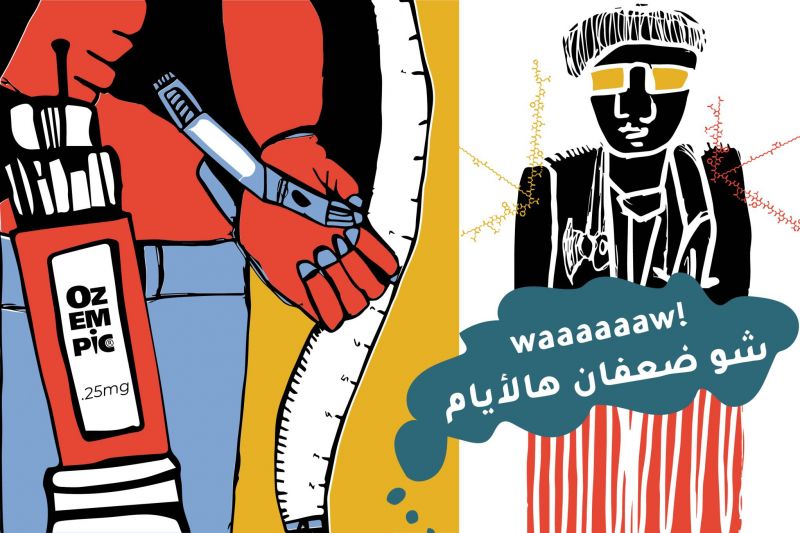
Illustration by Jaimee Haddad.
Illustrations by Jaimee Haddad
BEIRUT — Comments from friends and relatives, beauty ideals passed from one generation to the next, commercial billboards emblazoned with thin bodies. Instagram, TikTok, TV.
With mounting pressures to be thin, and blatant fat-phobia in Lebanon, Ozempic — an injectable diabetes medicine now also widely used for weight loss — has poked its way into the arms and thighs of many Lebanese, once a week, four times a month .
Ever since its skyrocketed popularity, Ozempic has seen intermittent shortages in Lebanon, and for a reason. It's no longer just celebrities and social media influencers that turn to Ozempic for weight loss. It's also your neighbor, your friend, your friend's friend, and maybe even your parents.
So, what is Ozempic?
“I’ve always had an unhealthy relationship with food,” says Marwan*, a 26-year-old medical student from Lebanon.
He's been losing and gaining weight ever since his teenage years and struggles with binge eating disorder.
 Illustration by Jaimee Haddad.
Illustration by Jaimee Haddad.
It's the unsolicited comments and opinions about his weight that get to him the most, coming from people he hasn't seen in a while.
Marwan started taking Ozempic in September 2023.
Meant to treat people with diabetes, Ozempic “does not only increase insulin levels but also delays gastric emptying, prompting the stomach to take more time to send everything to the intestines,” explains Stephanie Baddour, a clinical dietitian and co-founder of the educational platform Dietitics Institute for Continuous Education (DICE).
When gastric emptying slows down, people feel “supersatiated,” Baddour explains — and therefore less hungry. It is that specific side effect that led people to start using it for non-diabetic purposes, en masse.
[Click here to read more about how Ozempic works.]
There are also few — if any — statistics yet available on the spread of Ozempic in Lebanon, according to Dr. Jihane Ghorayeb, a Lebanese health psychologist working in the United Arab Emirates.
Hard data on fatphobia and eating disorders is also sparse. A 2021 study of 90 Lebanese women found that “messages that women receive from the media, family, and peers are often intended to promote the female thin ideal, and these messages may contribute to the development of eating disorders.”
The study did not include men or gender non-conforming people.
 Illustration by Jaimee Haddad.
Illustration by Jaimee Haddad.
When Marwan got his own stash of Ozempic back in September, it was simple — since his parents are also on the drug for weight loss, they simply got extra and gave it to him.
Soon, the changes began.
Slim figure aspirations, but wavering commitment
Baddour's job has no shortage of frustrations. Clients usually express a desire to lose weight, but many lack the will to change their lifestyles long-term. Instead, she says, many clients opt for quick fixes.
“Patients want to lose weight, but they don't want to exercise, nor fix their relationship with food,” propelling them into yo-yo diets and constant weight fluctuations.
The main concern of these clients, according to Baddour: social pressure and the prevalent diet culture in Lebanon.
“We unfortunately live in a country where people are obsessed with how much you weigh and how you look. The first comment that you would receive whenever you're seeing someone that you haven't seen for a while, is usually about your weight: 'Oh you've lost weight, you gained weight.' It’s really ingrained in our culture.”
Baddour and her work partner and co-founder of DICE Romy Moujaes are among the few dietitians in the country who are using their platform to raise awareness against fat-shaming. They are also advocating for balanced and more sustainable eating habits to end the diet cycles.
But with a new “quick fix” in Lebanon’s diet culture, can their efforts work?
Pressure to stay 'thin'
“To be very honest, we always tend to blame society for the constant pressure being placed on us, but it’s not just society altogether,” Marwan says. “It’s less so society but more so family members and acquaintances that you don’t see too often that usually pressure me the most.”
George*, a 26-year-old business development manager, recalls growing up surrounded by friends and family whom he says were superficial, often critical of other people’s looks.
He, however, doesn’t remember any negative comments from distant relatives – per se – but more of a constant push towards losing weight, which felt like “positive reinforcements” for him.
But around the age of 12 or 13, George began noticing a change. He remembers becoming self-conscious about his appearance. He was also overweight and developed bulimia, an eating disorder he still struggles with today.
 Illustration by Jaimee Haddad.
Illustration by Jaimee Haddad.
As a teenager, he went from one dietician to another, who prescribed him restrictive diets and promised fast results.
“Every time I’d lose weight, I’d get comments from relatives congratulating me and telling me how proud they are. When you’re a kid, you’re constantly looking for appraisal.”
“But when you grow up, assess your relationship with food, and the way you view your body while constantly thinking about weight loss. This is when I made a few realizations.”
For one, he moved through the world differently whenever he’d manage to lose some weight.
“I believe that people tend to see thin as pretty, and pretty gets you privileges. I feel like whenever I lose weight, people are nicer to me.” He says the way people treat him when he’s “skinnier” pushes people to want to always maintain a thin silhouette. Still, up until that point he had not tried any weight loss injectables.
When his friends — who also struggled with eating disorders — opted for Ozempic in recent months and noticed “improvements,” the idea became appealing for him as well.
And then, in April 2023, he got a prescription.
The need to feel ‘in control’
A 2017 study of 104 eating disorder patients in Lebanon found that nearly half of them suffered from anorexia nervosa, followed by 40 percent with bulimia and 14 percent with binge eating disorder. It was not clear how prevalent those disorders were among the general population, though.
Dr Ghorayeb says she believes that the financial crisis of the past several years, political instability and now the specter of a larger war, could increase the risk of developing a disorder among those individuals who are already vulnerable.
 Illustration by Jaimee Haddad.
Illustration by Jaimee Haddad.
In times of high stress, “people who already have a predisposition, or a tendency to want to be in ‘control’, will tend to further restrict what they eat and engage in other restricting behavior,” or purging. It is those same individuals who may be inclined to opt for medication like Ozempic to exert “control.”
But the lack of published data on the rate of Ozempic intake among people with eating disorders in Lebanon means the extent of that potential connection is not fully clear, according to Dr. Ghorayeb.
Nevertheless, Dr. Ghorayeb says that in general, people who no longer feel in control of their outside environment may turn their attention inward, to things they could control — such as their own body appearance.
One method of control “could be Ozempic because it's available,” she explains.
But the fact that the medication is not a cheap drug, already limits who can access it. Dr. Ghorayeb feels this is a “protective” factor for the most vulnerable.
Ozempic, the lesser of two evils?
Marwan says societal pressures had little to do with his choice to take Ozempic, though negative comments about his body from distant friends and family members bothered him. He maintains that he took the Ozempic for his own health.
Despite side effects like nausea, Marwan kept taking his weekly injections, and he claims it was those very side effects that made Ozempic work for him.
He also says he's now opting to eat more salads, which he never did before. Marwan has lost 15 kg in around five months, he says, and feels happier.
Meanwhile, George has now been on a 1 mg dosage of Ozempic for nine months. He says he knows the drug has some negative side effects, but he's lost 30 kg and finds he's much more comfortable with his body.
“I don’t worry too much before going out anymore.”
 Illustration by Jaimee Haddad.
Illustration by Jaimee Haddad.
He also says he spends less time obsessing over his weight. Before starting Ozempic, he used to feel dizzy because he'd “starve” himself sometimes, or swing between different purging methods. Now he can eat “just fine” during the day.
“I no longer worry about eating too much or binge eating, because Ozempic controls that for me, and that is something I've struggled to do for the last 15 years. It’s kind of weird that this drug can provide this form of relief for me.”
George stresses that he does not worry himself with other people's weight. “I don’t go around pushing people to go on diets.” Deep down, he says, he does not believe that thinness and attractiveness always go together — yet still he feels social pressures on himself.
This, he says, is what pushes him to keep taking Ozempic, despite the side effects.
Would he have sought out the drug had there been no societal pressures to be thin?
“No, I wouldn't have,” said George. “In fact, I wouldn't have cared about the way I look, and I don't think I would have gotten an eating disorder if I didn't care about society.
But, I do care about society.”
* Names have been changed at the request of these interviewees to protect their medical privacy.